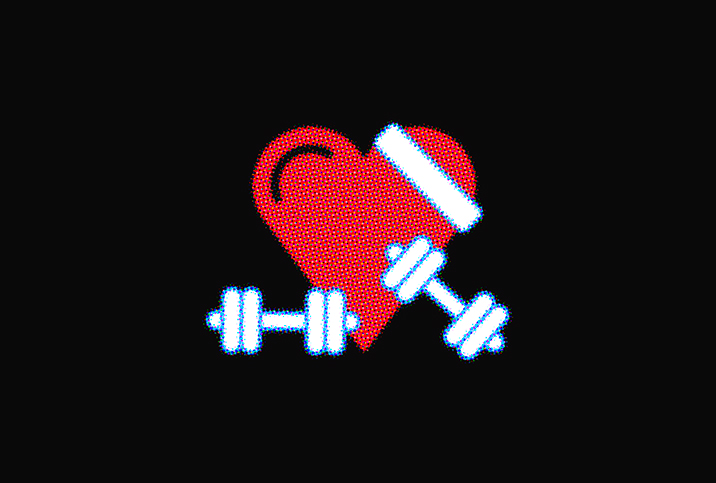Live Your Best Life With Heart Disease

The heart, despite its size, has a big position to fill in the human body. This compact organ is responsible for pumping filtered and oxygenated blood throughout the body. Without a healthy heart, circulation impediments can disrupt all areas that depend on blood flow—that's everywhere from the tips of your toes to your reproductive organs to your brain.
Given the heart's outsized importance, heart disease is not something to take lightly.
Heart disease is a comprehensive term that refers to a class of conditions with a negative impact on cardiovascular efficiency. Some of the most common are heart failure, coronary artery disease (CAD), atherosclerosis and arrhythmia, specifically atrial fibrillation. These diseases can be inherited, present at birth or develop over time due to an array of environmental and personal risk factors.
Knowing you have heart disease can be intimidating, but it doesn't have to disrupt your entire life. You can still live actively, facilitate personal relationships and have a family of your own, if you care for yourself.
Living with heart disease
Because there are so many types of heart diseases, living with these conditions means different things for different people. Long-term treatment and management plans will be individualized for each patient.
"The long-term outlook is really defined by how healthy your heart muscle is because the arteries are just a conduit to deliver blood to the heart muscle so it stays healthy," said Daniel L. Kulick, M.D., a board-certified cardiologist with Providence Mission Hospital in Mission Viejo, California. "So as long as we can keep those conduits healthy, the person's outlook is really quite good. It's often coming to grips with, in most people, requiring significant lifestyle changes."
For a lot of people, that means preventive and restorative medicine, according to Steven Gundry, M.D., a cardiothoracic surgeon turned author and podcast host in California. He said there is proven efficacy with the approach. He pointed to stable angina as an example. It is a condition that involves known blockages in coronary arteries that cause chest pain during physical activity.
"If you look at people with stable angina and randomized them to maximal medical therapy—diet and lifestyle changes and medications versus stenting and coronary bypass—and follow them for 10 years, there's absolutely no difference in the outcome," he said.
These findings suggest the least intensive way to live with heart disease is to adopt a heart-healthy lifestyle. Medical procedures are not an end-all-be-all solution and don't make a person immune to future cardiovascular problems.
Dating with heart disease and talking to a partner
Someone with heart disease can experience a strain on their love life. In these instances, communication is the foundation of relationship longevity. Patients need to feel safe and supported, and their partners should be equipped to fulfill that role without being overbearing.
The only way to do that is by discussing what is and isn't helpful for their specific ailment. Otherwise, the situation may become worse and lead to worsened cardiovascular health, or even separation. If a couple needs extra guidance or reproductive assistance, it may be prudent to seek counseling.
Any medical diagnosis can change your outlook on life and relationships. Heart conditions in particular may make a person reluctant to seek companionship and sexual encounters due to fear of repeat attacks and reduced confidence stemming from surgical procedures or implants.
However, for most patients, sex is more than safe. It's actually helpful because intercourse is a heart muscle-strengthening physical activity. Maybe don't substitute it for a daily workout, but sex can help the heart. Physical activity improves the circulation vital for fueling the reproductive organs that make sex possible for both men and women.
Heart disease prevention
First, it is critical to assess your risk of developing heart disease. Make sure your doctors are aware of any family history and address any concerns with them to see if you need a referral to a cardiologist.
If you receive a heart disease diagnosis, Kulick strongly recommends following up with doctors at regular intervals. Even if you undergo a surgical procedure or receive an implant, you need regular follow-ups because no procedure "fixes" heart disease.
There are myriad heart conditions; fortunately, treatment options outnumber them. The least-invasive methods involve diet and lifestyle modifications, many of which both prevent and fight heart disease.
These practices are fully endorsed by Kulick and Gundry. Kulick said the top measures to combat heart disease include:
- Reducing low-density lipoprotein (LDL) cholesterol
- Optimizing blood pressure and glucose (especially if the patient is diabetic or prediabetic)
- Smoking cessation
Gundry recommends a diet rich in polyphenols and prebiotic fiber and avoiding lectins as much as possible, which promotes the flourishing of good bacteria within the digestive system.
Kulick identified obesity as another major culprit for heart disease development and progression, and both he and Gundry supported exercise and weight loss as beneficial heart-healthy practices.
Heart disease aftercare
People who do require medical interventions for heart disease, such as bypass surgeries, transplants or other procedures, need to place particular emphasis on follow-ups with doctors to assure things are healing properly. Follow-up also minimizes the risk of having repeat operations, which can add up quickly.
Kulick stressed medication adherence and cessation. He said to never stop medicines on your own and consult a doctor about adverse reactions, so they can decide whether to continue or change the current treatment.
The goal is to individualize the patient by determining how troublesome the reactions are versus the severity of the problem you're treating, along with what the possible alternative therapies are. Every case is different, so be conscientious about finding the right long-term care.
Resources for patients and caregivers
Caring for heart disease is no easy feat, whether it's you or someone close to you. One of the greatest resources is a cardiac rehabilitation program specifically designed to help people with heart conditions through information, support and physical activity.
They are excellent for recovery assistance after episodes such as a heart attack, stroke or heart failure.
In addition to physical health, Kulick mentioned they feature mental health services to cope emotionally with the conditions.
Heart disease affects millions of people, and it is extremely beneficial to make connections with others in the same situation. Always collaborate with your treatment team and follow medical protocol. Educate yourself and others about these serious illnesses, and make sure to take every preventive measure you can to avoid being affected.


















